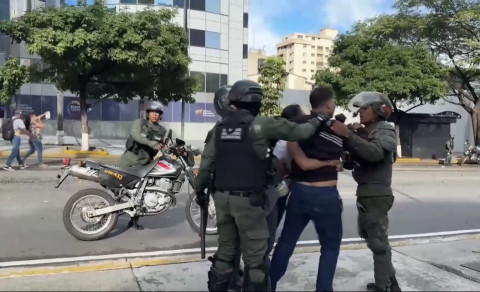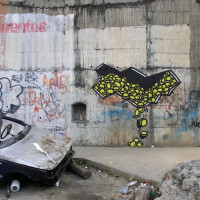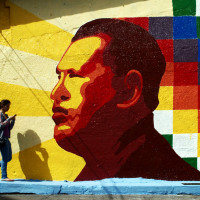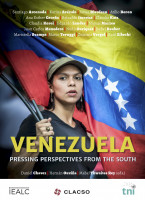Solidarity with Venezuela’s Left Opposition A Call for Principled Anti-Authoritarianism
Temas
Regiones
The global left must stand up for left thinkers and activists facing persecution in Venezuela, and reject false anti-imperialism that allows an authoritarian drift.

By Confidencial, CC BY 3.0, https://commons.wikimedia.org/w/index.php?curid=151395812
During August 2025, the Venezuelan government stepped up its attacks on human rights defenders and domestic critics of its increasingly authoritarian regime. On 7 August, the mothers of young detainees holding a vigil outside the Supreme Court were attacked by government vigilantes. Less than a week later, Venezuela’s official state radio denounced a ‘network of organisations and individuals who, under an environmentalist academic facade, have operated in Venezuela as tools for political interference and international opposition to the Venezuelan state”. They specifically blamed the Rosa Luxemburg Foundation and named TNI associate Edgardo Lander, Alexandra Martínez, and Emiliano Terán Mantovani. Lander, along with Francisco Javier Velasco and Santiago Arconada, is being accused of being responsible for “destabilisation actions against Venezuela”.
The persecution of left intellectuals and progressive organisations represents a critical test for the international left. The Venezuelan government continues to engage in widespread abuses against critics through politically motivated threats and widespread detentions, a year after the disputed presidential election. Yet, too many on the global left remain silent when the victims are fellow leftists rather than right-wing opposition figures.
Edgardo Lander, a prominent Venezuelan sociologist and longtime leftist intellectual, was initially supportive of Venezuela’s Bolivarian Revolution in its early years but later became highly critical of Nicolás Maduro’s successor government. Lander had stated in a Democracy Now! interview following the 2024 elections that “there’s no doubt that Maduro lost these elections” and that sufficient evidence of his alleged win, “as expected and established by the law, is completely absent”. His principled stance represents the kind of critical left analysis that authoritarian governments fear most.
The targeting of the Rosa Luxemburg Foundation demonstrates how the Maduro government weaponises anti-imperialist rhetoric to silence legitimate left criticism. President Maduro accused the foundation of financing “infiltrators” and claimed it represents efforts to attack his government “from within”. At the same time, the Ministry of Communications described the foundation as part of “a network of organisations that operate as instruments of interference”. In response, the Rosa Luxemburg Foundation stated that they “observe with concern the current defamation campaign against left human rights organisations and left intellectuals”. The government’s actions reflect classic authoritarian tactics, using nationalist and anti-imperialist claims to delegitimise domestic dissent.
Learning from Nicaragua: The Cost of Left Silence
The situation in Venezuela eerily mirrors Nicaragua under Daniel Ortega and Rosario Murillo. The Nicaraguan government is responsible for systematic human rights violations, with arbitrary detentions of perceived opponents, including human rights defenders, critics, and journalists. Constitutional reforms have elevated Ortega’s wife to “co-president” and extended executive control, with dissident Sandinista organisations describing it as an attempt to mask absolute power through legislative changes.
Nicaragua has seen the closure of over 5,000 NGOs since 2018, with President Ortega and Vice President Murillo intensifying repression through forced exile and citizenship revocation. In less than a decade, about fifty independent media outlets have closed and their assets confiscated, while 46 journalists were forced into exile in 2024 alone. Yet, significant sections of the international left remained silent as Ortega transformed from a revolutionary leader to an authoritarian strongman, just as many now remain silent about Venezuela’s trajectory.
Manufactured Crises and Real Threats
Recent media reports about US naval operations near Venezuela illustrate how the Maduro government exploits international tensions to distract from domestic repression. Maduro announced the deployment of 4.5 million militiamen across the country following reports of US Navy ships in the region. While reports of US naval movements near Venezuelan waters have appeared in American media, the extent and nature of any current military presence remain uncertain, with contradictory statements from various officials.
The Trump administration’s ambiguous and sometimes contradictory messaging toward Venezuela – ranging from diplomatic overtures to explicit threats – creates a complex geopolitical landscape where genuine security concerns intersect with manufactured crises. This dynamic serves multiple purposes: it rallies nationalist sentiment, provides cover for increased militarisation, and most importantly, allows the government to frame any domestic criticism as foreign interference. The Venezuelan government’s response reveals the gap between international rhetoric and domestic messaging. While Maduro mobilises militia members against alleged US threats, Vice President Delcy Rodríguez stated that Venezuela is only concerned about the ships with oil leaving their ports, including those from US company Chevron, rather than the alleged warships. As Comunes noted, the government “prefers a thousand times a false polarisation” with the far-right opposition “from which it benefits and is able to sustain its precarious internal cohesion, than to have to respond to people’s demands and criticism from the left”.
The international left must recognise how both real geopolitical tensions and manufactured crises function to silence legitimate criticism. Supporting genuine anti-imperialism cannot mean accepting authoritarian rule when it comes wrapped in revolutionary rhetoric, nor can it mean ignoring how governments instrumentalise external threats to suppress internal dissent.
The Path Forward: Principled Solidarity
The global left faces a crucial choice: continue enabling authoritarianism through uncritical “anti-imperialist” solidarity, or embrace principled support for genuine democratic socialism that protects dissent and criticism.
This critique from the left does not imply a reconciliation with the traditional right, much less does it mean defending the interests of US imperialism or supporting a Trumpist military intervention. On the contrary, it is just driven by the urgent need to recover the emancipatory horizon that Madurismo has buried under authoritarianism and corruption, maintaining a genuine anti-imperialist perspective that distinguishes between popular sovereignty and the perpetuation of corrupt local elites.
Criticising the Maduro government’s authoritarian drift does not mean ignoring or minimising US imperial threats. Rather, it recognises that the Venezuelan people deserve both protection from external interference and freedom from domestic repression. Genuine anti-imperialism must include opposition to all forms of authoritarian power, including those that emerge from formerly progressive movements.
As Venezuelan leftists argue, “the left needs to take a stand against Maduro’s authoritarian drift so that together, in solidarity, we can defend democracy, sovereignty and the self-determination of our people”. This means supporting comrades who represent the critical left tradition that challenges power wherever it emerges, whether from imperial centres or local authoritarian governments.
Our left comrades in Venezuela are, as the leftist Latin Americanist magazine NACLA notes, "the activists and grassroots movements fighting for the rights of workers, indigenous peoples, women, and local communities" – not a government that represses these very movements when they become inconvenient. As Comunes declares, "The way to defend the homeland is through greater freedoms and more democracy, and never with authoritarianism and the persecution of those fighting for social justice".
The struggle against imperialism and the struggle against authoritarianism are not contradictory. They are two sides of the same fight for human dignity and democratic self-determination. Supporting Venezuela’s left critics is not betraying anti-imperialist principles; it is upholding them in their truest form.
This critique should not minimise real concerns about US imperial ambitions in the region. The Trump administration’s contradictory and sometimes threatening rhetoric toward Venezuela, combined with decades of sanctions and interventionist policies, creates real geopolitical tensions that the Venezuelan government rightfully considers. The history of US interventions across Latin America – from Chile to Nicaragua and from Haiti to Honduras –demonstrates that concerns about external interference are not fabricated. However, acknowledging legitimate anti-imperialist concerns cannot become an excuse for ignoring domestic authoritarianism or silencing left voices that expose governmental failures.
The left opposition in Venezuela deserves our solidarity, not despite their criticism of the Maduro government, but because of it. The left that abandons its own critics is a left that has lost its way.



